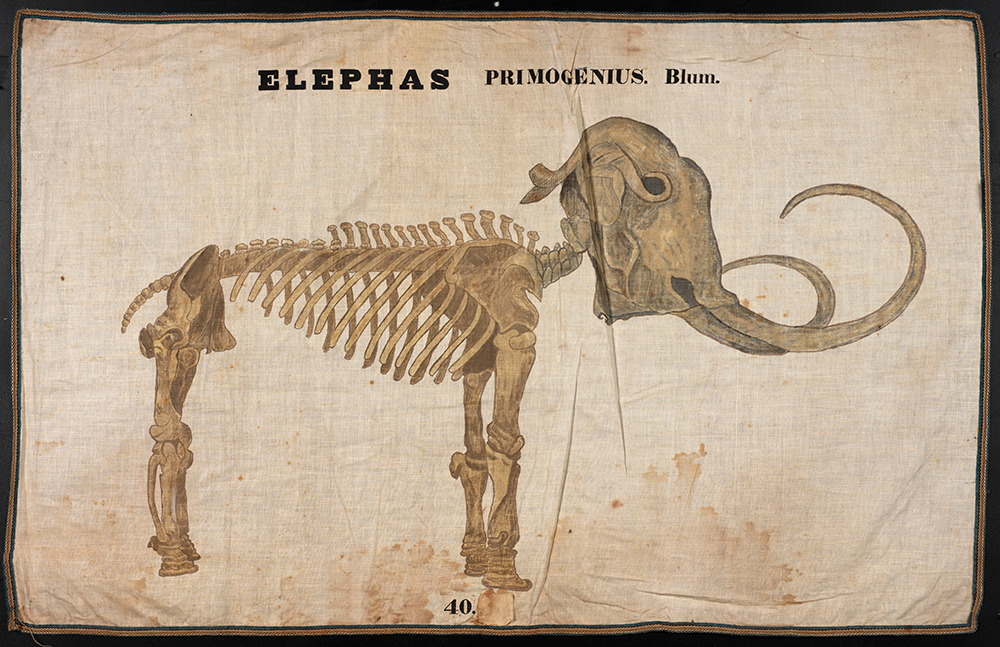
The Dentes Elevent shirt is inspired by this drawing used in Amherst geology classes in the 19th century.
See the Collection
See the stories behind the swag on our Bicentennial Collection page.
If you’re someone who likes to urge, with gusto, Carpe diem! or, more warningly, Caveat emptor! or say, cheerfully, Bonus! (it’s Latin for “good”), then you’ll appreciate this new Latin coinage:
Dentes Elevent!
Pronounced “den-tays ay-luh-went,” it means “Tusks Up!,” which is a student rallying cry that stomped into great popularity once the Mammoth became the College mascot in 2017.
The translation appears in a new vintage merchandise line created for the College’s Bicentennial. The line offers up, for example, 1920s-style football posters; tote bags with artsy covers of student literary magazines; and a hoodie designed like the Johnson Chapel doors.
It also includes a Dentes Elevent! T-shirt. The shirt takes inspiration from a mammoth skeleton drawn by 19th-century artist Orra White Hitchcock for class use by her geologist husband, Edward Hitchcock, the College’s third president.
Hitchcock labeled her mammoth (in somewhat shaky Latin) Elephas primogenius, or “first-born elephant.” That brings us to the tricky task of applying an ancient language to modern use. It involves problem-solving, nuance and thoughtful discussion—a process that struck me as a good microcosm of the Amherst experience.
So I reached out to the two classics professors responsible for the translation, Andreas “Tom” Zanker and Christopher van den Berg. They’ve have had weirder work, by the way: each has been consulted, out of the blue, by folks getting tattoos in Latin who wanted to get the grammar right.
The first challenge, they said, was that the Romans had never seen a mammoth or its skeleton—so they had no word for it. The late-empire Romans became brutally familiar with elephants, however, when invaders (Pyrrhus, followed by Hannibal) deployed them in battle starting in 280 BCE.

The purple Dentes Elevent shirt; a hoodie designed like the Johnson Chapel doors; and tote bags decorated with covers of student literary magazines.
The Romans called the elephant a “Lucanian cow,” named for the area in southern Italy where that first confrontation took place. Later, they borrowed elephantus from the Greek elephas, which may stem from a similar Phoenician word.
When the Romans looked at the elephant’s tusk, the word that seems to have sprung to mind was tooth. The word dental, for example, comes from the word dens, which means “tooth,” but it can also mean “tusk.”
For Zanker and van den Berg, Dentes Elevate! (“Raise Your Tusks!”) was a contender, and it worked well since the verb is in the plural, with the speaker addressing a group (or herd) or the bleachers at Pratt Field. But they feared folks would pronounce it like the English elevate rather than the correct “el-uh-watt-ay.”
Dentes Levate! would have also done, though on first glance it seems to ask the impossible (“Levitate Your Teeth!”). Dentibus Elevates! (“With Tusks Uplifted!”) was accurate, too, but it’s a Latin construction called an ablative absolute that is less commanding than the others.
How to choose? An impromptu (that’s Latin for “in readiness”) student focus group helped out. One participant, Leland Culver ’24, took Latin in high school and an Amherst course on the poet Catullus. Culver says the students thought “Dentes Elevate! was kind of doofy. It looked like ‘Teeth Elevate!’— which was a little weird.”
Culver is hardly the first to note the perils of bad translation. Out at a New Haven bar in 1946, an Amherst student challenged some Yalies to translate Amherst’s motto. One paused, thought a bit. Then he ventured: “Shiny Dirt?”
In the end, van den Berg proposed Dentes Elevent (“Let Them Raise Their Tusks”), which has a nice parallel to Terras Irradient (“Let Them Illuminate the Lands”).
So, Tusks Up! Dentes Elevent! Put your heart into it. Your teeth, too.
Photos by Maria Stenzel